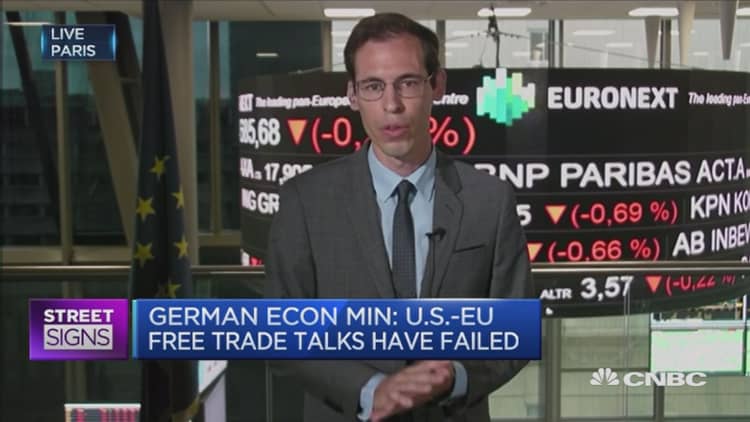
A failure to secure a transatlantic trade deal would have a "substantial" effect on France as the world economy slowed down, Laurent Clavel, senior international economist at AXA IM, told CNBC Monday.
Clavel explained that France would fall victim to "less and less trade compared to activity," and he expected "world growth to slow down, especially for developed markets," which would invariably hit France.
On balance, Clavel said that the latest economic data coming out of France was "quite reassuring," despite acknowledging "some structural issues" and a "closing of the trade openness."
Clavel's assessment came after Germany's Vice-Chancellor Sigmar Gabriel said over the weekend that TTIP negotiations had failed. France's Trade Minister Matthias Fekl told CNBC earlier Monday that the U.S. was to blame for the stalled talks.
France's second-quarter gross domestic product (GDP) figure showed no growth quarter on quarter and was a "disappointment" according to Clavel. But, he conceded that the data came after a very strong first quarter. Clavel said that the first three months of this year were boosted by "temporary factors," such as the sales of tickets for the Euro 2016 football tournament, which also boosted household and service consumption.
Clavel's "fairly positive diagnosis" for the French economy was bolstered by a sharp decline in the country's second-quarter unemployment rate, recorded at 9.9 percent – the lowest since mid 2012 – which Clavel cited from the National Employment Agency. He also discussed the impact of "strikes and disruption in [oil] refineries" in recent months as ultimately contributing to stronger third quarter.
Overall, the second-quarter GDP figure "doesn't really change our forecast which is around 1.4 percent [growth] for 2016," said Clavel. He added that whilst this prediction was not particularly strong, it was "not really challenging our perception that there is a modest recovery in France."
However, Clavel did reference the "sharp decline" in tourism to France due to recent terrorist attacks. "Several companies are reporting falls of around 10 percent year on year," he said.

